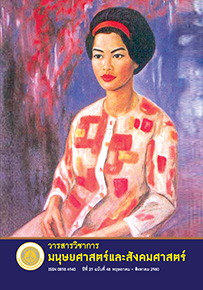การพัฒนาการปรึกษากลุ่มบูรณาการพหุทฤษฎี ระหว่างทฤษฎีอัตถิภาวะนิยมและทฤษฎีเผชิญความจริง เพื่อเสริมสร้างเหตุผลเพื่อการดำรงชีวิตอยู่ของผู้ต้องขังหญิง ในทัณฑสถานหญิง A Development of Integrative Multi-Theoretical Group Counseling: Existential and Reality...
Main Article Content
Abstract
บทคัดย่อ
การวิจัยในครั้งนี้เป็นการวิจัยและพัฒนา โดยมีวัตถุประสงค์เพื่อสร้างและตรวจสอบรูปแบบการปรึกษากลุ่มบูรณาการพหุทฤษฎี เพื่อเสริมสร้างเหตุผลเพื่อการดำรงชีวิตอยู่ของผู้ต้องขังหญิง และศึกษาผลของโปรแกรมการปรึกษากลุ่มบูรณาการพหุทฤษฎี จากนั้นทำการรับรองรูปแบบการปรึกษากลุ่มบูรณาการพหุทฤษฎี กลุ่มตัวอย่างได้แก่ ผู้ต้องขังหญิงที่มีคดีต้องโทษ 10 ปีขึ้นไป ที่อยู่ในทัณฑสถานหญิงชลบุรี ที่มีคะแนนแบบวัดเหตุผลเพื่อการดำรงชีวิตอยู่ ในระดับต่ำกว่าเปอร์เซ็นต์ไทล์ที่ 25 สอบถามความสมัครใจเพื่อเข้าร่วมโปรแกรมได้ จำนวน 22 คน สุ่มอย่างง่าย แบ่งเป็น 2 กลุ่ม คือ กลุ่มทดลองจำนวน 11 คน และกลุ่มควบคุมจำนวน 11 คน โดยกลุ่มทดลองได้รับโปรแกรมการปรึกษากลุ่มบูรณาการพหุทฤษฎีสัปดาห์ละ 3 ครั้ง จำนวน 6 สัปดาห์ รวมเป็น 17 ครั้ง ครั้งละ 60-90 นาที และกลุ่มควบคุม ไม่ได้รับโปรแกรมการปรึกษากลุ่มบูรณาการพหุทฤษฎี
ผลการวิจัยพบว่า ผู้ต้องขังหญิงที่ได้รับโปรแกรมการปรึกษากลุ่มบูรณาการพหุทฤษฎี มีเหตุผลเพื่อการดำรงชีวิตอยู่ในระยะหลังทดลอง และระยะติดตามผลสูงกว่ากลุ่มควบคุม อย่างมีนัยสำคัญทางสถิติที่ระดับ .05 และผู้ต้องขังหญิงที่ได้รับโปรแกรมการปรึกษากลุ่มบูรณาการพหุทฤษฎี มีเหตุผลเพื่อการดำรงชีวิตอยู่ในระยะหลังทดลองและระยะติดตามผล สูงกว่าในระยะก่อนทดลองอย่างมีนัยสำคัญทางสถิติที่ระดับ .05
Abstract
This research and development study aimed to develop and test the model of integrative multi-theoretical group counseling on reasons for living of female inmates. It also examined the result of using the program and validated the model of integrative multi-theoretical group counseling based on Existential and Reality Therapy. The participants were female inmates in the Chonburi Detention Center sentenced to be prisoned for more than 10 years. They were selected by measuring their reasons for living, and they gained the score of less than the 25 percentile. Twenty two participants were conveniently picked and match-pair divided into an experimental group and control group, 11 participants each. The experimental group received counseling based on the integrative multi-theoretical group program using existential and reality therapy three times a week for six weeks, totaling 17 sessions. Each session lasted 60-90 minutes. On the other hand, participants in the control group did not.
The results show that there was a significant. The female inmates who received the counseling with integrative multi-theoretical group program based on existential and reality therapy had significantly higher scores on reasons for living in the post-trial and the follow-up than those in the control group at the significant level of .05. In addition, the female inmates who received the counseling with integrative multi-theoretical group program based on existential and reality therapy had significantly higher reasons for living in the post-trial and the follow-up than those in the pre-trial period at the significant level of .05.
Downloads
Article Details
บทความทุกบทความเป็นลิขสิทธิ์ของวารสารวิชาการมนุษยศาสตร์และสังคมศาสตร์ มหาวิทยาลัยบูรพาเท่านั้น


